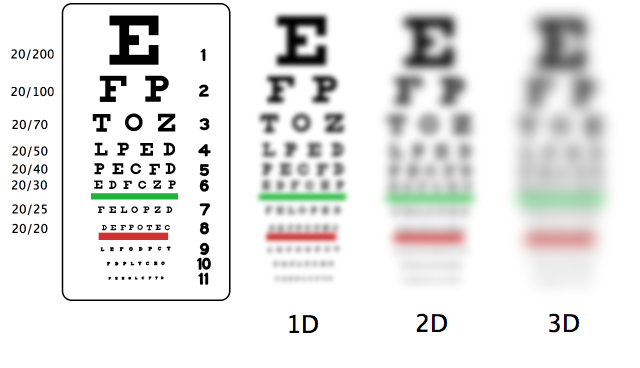Vision Therapy: Training your eyes for better performance
10:35 PMGrowing up, I always just thought that my vision was what it was. I'm sure most of you felt the same way: I needed glasses so I had "bad" eyes. But with glasses (or eventually contact lenses) I could see 20/20 again, so I was "artificially" perfect again. Everything seemed that simple. You read the 20/20 line, you pass the test.
But imagine if you could see even better than "perfect". Fellow optometrist, Dr. Mike Peters, explores just that in his new article with Men's Health detailing the relationship between visual performance and athletic performance. Some humans actually have the ability to see far beyond perfect 20/20-- in fact the best recorded human visual acuity is 20/8. Imagine how much faster you would read the exit sign on the highway, or see a ball coming your direction from across the field. Not surprisingly, the best professional athletes tend to have superb visual acuity, not to mention phenomenal depth perception and reaction times.
So the best athletes tend to have excellent vision, but were they just born with these supernatural gifts? Even just a few years ago, many clinicians would have answered yes, at least in part, to this question. In the past few decades, great advances have been made in the field of vision therapy, and we are finding that your vision and visual abilities can be trained and developed just like any other skill set. As a child, every day you are learning to use your eyes and gaining better control. We don't start out seeing 20/20 (typically it is more like 20/80 by 1 year of age); our brain, our eyes, everything must grow to work together. You don't just see because you have eyes; you have to learn vision just like your learn how to walk. We used to think development of vision occurred only in childhood, but we are learning that this process doesn't just stop in elementary school. We can continue to help train the brain and eyes to improve visual function and performance. You won't train yourself out of needing glasses, but you can train your eyes to focus faster, have better depth perception, and process the images that you see much more quickly. This is vision therapy.
Sound interesting? Talk with your eye care provider to see if they offer vision therapy or sports vision services. More and more optometrists are specializing in this field, so even if your doctor doesn't offer vision therapy, they will be able to refer you to someone who does. Visit covd.org for more information!

















0 comments